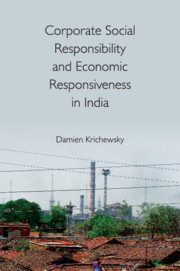Book contents
- Frontmatter
- Contents
- List of Tables and Maps
- List of Abbreviations
- Preface
- 1 Introduction
- 2 CSR, Functional Differentiation, and the Problem of Economic Responsiveness
- 3 Economic Differentiation and the Rise of India's ‘Embedded’ Corporate Capitalism
- 4 Increasing Functional Differentiation and the Rise of CSR
- 5 CSR at Work: Economic Responsiveness through Risk Management
- 6 India's CSR Public Policies and the Politics of Economic Responsiveness
- 7 Conclusion
- References
- Index
7 - Conclusion
Published online by Cambridge University Press: 26 April 2019
- Frontmatter
- Contents
- List of Tables and Maps
- List of Abbreviations
- Preface
- 1 Introduction
- 2 CSR, Functional Differentiation, and the Problem of Economic Responsiveness
- 3 Economic Differentiation and the Rise of India's ‘Embedded’ Corporate Capitalism
- 4 Increasing Functional Differentiation and the Rise of CSR
- 5 CSR at Work: Economic Responsiveness through Risk Management
- 6 India's CSR Public Policies and the Politics of Economic Responsiveness
- 7 Conclusion
- References
- Index
Summary
CSR as an intermediary institution for economic responsiveness
Companies are core institutions of modern society, and their role as both problem-making and problem-solving entities has become a major cause for concerns. While such concerns are not new, it has become hard to find any societal problem that does not involve companies in one way or another. Unemployment, child labour, occupational hazards and suffering at the workplace, growing financial instability, socio-economic inequalities, poverty and related hardships, public health issues such as cancer and obesity, militarized conflicts, energy (in)security, and the multiple manifestations of a global ecological crisis exemplify this vast entanglement in society between corporate conduct, problem genesis, and problem solution.
The phenomenon of CSR has grown out of this entanglement. At first, CSR emerged as an idea developed by American business ethicists and corporate executives who argued that companies can and should not focus single-mindedly on profit maximization. Companies were rather supposed to follow business practices that combine profit-making with moral standards and what was referred to as ‘service to the nation’. Building on this synergistic view, CSR has expanded globally and concretized into specialized knowledge, discursive frames, organizational structures and management practices, inter-organizational partnerships, collaborative governance structures, and a vast corpus of public and private regulatory norms. These multiple facets of the global CSR phenomenon are held together and stabilized by the same core idea that was at the origin of the CSR doxa : companies can and should go beyond legal compliance and business as usual, and invest resources in finding ways to minimize societal problem-making while maximizing their contributions to societal problem-solving.
Notwithstanding this stable core, CSR has been caught in ongoing academic and popular contention regarding its scope and meaning. For some, CSR is a managerial fancy that should not be taken too seriously. Others conceive of CSR as a phenomenon of major significance, as it could potentially redeem capitalism by channelling ethical, social, and environmental concerns into the functioning of firms. Yet another standpoint also views CSR as a significant phenomenon, but in a negative way. For critical commentators, CSR is primarily a vehicle of corporate hegemony which ends up subordinating non-economic spheres of society to the capitalist logic of monetary accumulation. In view of these debates, whether and how CSR actually changes the way social systems observe and address social problems remains an open question.
- Type
- Chapter
- Information
- Publisher: Cambridge University PressPrint publication year: 2019



